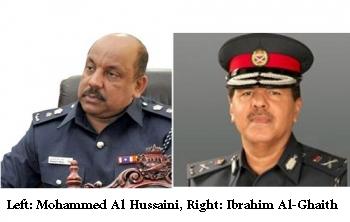The families of detainees in ward 10 of the Dry Docks prison, where political prisoners tried under the terrorism law are being held, such as the cases known as “The Imam Army”, “5 tons explosives” and “February 14 case” of which the Human Rights Defender Naji Fateel is charged, said that in the early hours of morning a large number of prison guards started a sudden search. They humiliated, tortured and abused political detainees by cursing, severely beating with batons, using peper sprays and threatening them. Some of the prisoners defended themselves that resulted in the security forces using more violence. The BCHR received confirmed information from sources that the prison guards and security forces used stun grenades and teargas inside closed cells that resulted in at least 40 injuries.
The Director of Reformation and Rehabilitation Colonel Mohammed Rashid Al Hussaini claimed, on the Ministry of Interior twitter account, that “a number of detainees at the detention center were involved in rioting. They tried to break doors, the police interfered and restored order.”
Director of Reformation and Rehabilitation: a number of detainees at the detention center were involved in rioting #Bahrain (Cont)
— Ministry of Interior (@moi_bahrain) August 16, 2013
They tried to break the doors, the police interfered and restored order #Bahrain
— Ministry of Interior (@moi_bahrain) August 16, 2013
However, the families are in a state of panic after the calls and reports they from the prison. One of the families said that they heard the screams and the sound of the shooting when they were on the phone with their son. Another family spoke of their son crying out to be saved. The last call received was reported at 5am. At the time of writing this report, no further information was available. The reports obtained from the prison stated that there are dozens of injured prisoners and at least one in a critical condition.
It’s important to note that prisoners in this section of the prison have been continuously subjected to ill-treatment and denied their rights of visits and were prevented from going outside their cells.
Maryam Al-Khawaja, Acting President of the BCHR, said:
“Abuse and ill-treatment of political prisoners is systematic in Bahrain. The use of crowd control weapons inside the prisons is specifically alarming, as this violates many local and international laws. We are especially concerned about the injuries at a time when prisoners in Bahrain are not allowed access to adequate medical care. We need urgent actions from the United Nations and the ICRC to look into the situation of these political prisoners. We reiterate that the further deterioration of the human rights situation both inside and outside prisons is the direct result of the lack of local and international accountability for the Government of Bahrain. This is especially in regards to the international impunity granted to the authorities in Bahrain by their closes allies, namely the United Kingdom and the United States”
This is not the first time BCHR receives information on violent attacks on prisoners in Bahrain at prison facilities. BCHR holds Major-General Ibrahim Habib al-Ghaith, the Ministry of Interior's Inspector General and Colonel Mohammed Rashid Al Hussaini, the Director of Reformation and Rehabilitation directly responsible for any harm to the prisoners.
Based on the above, the BCHR calls the following:
1. Immediately allow local and international independent NGO’s and the International Committee of the Red Cross to visit the prisons and the permanent and temporary detention centers. Also, provide the environment for these bodies to carry out their roles, neutrally and independently;
2. Immediately investigate all claims of the use of excessive force against political prisoners, and bring forth anyone found guilty to a fair and independent court of law.
3. Inform the families of prisoners and detainees about the conditions of their sons and the extent of the damage that has befallen them from these injuries, as well as provide the necessary and instant treatment for them.
4. Abide by the international standards for the treatment of prisoners, foremost the Basic Principles for the Treatment of Prisoners adopted by the United Nations in December 1990, as well as the Standard Minimum Rules for the Treatment of Prisoners recommended for adoption by the First United Nations Congress on Crime Prevention and the Treatment of Offenders, held at Geneva in 1955 and approved by the Economic and Social Council in July;
/129

